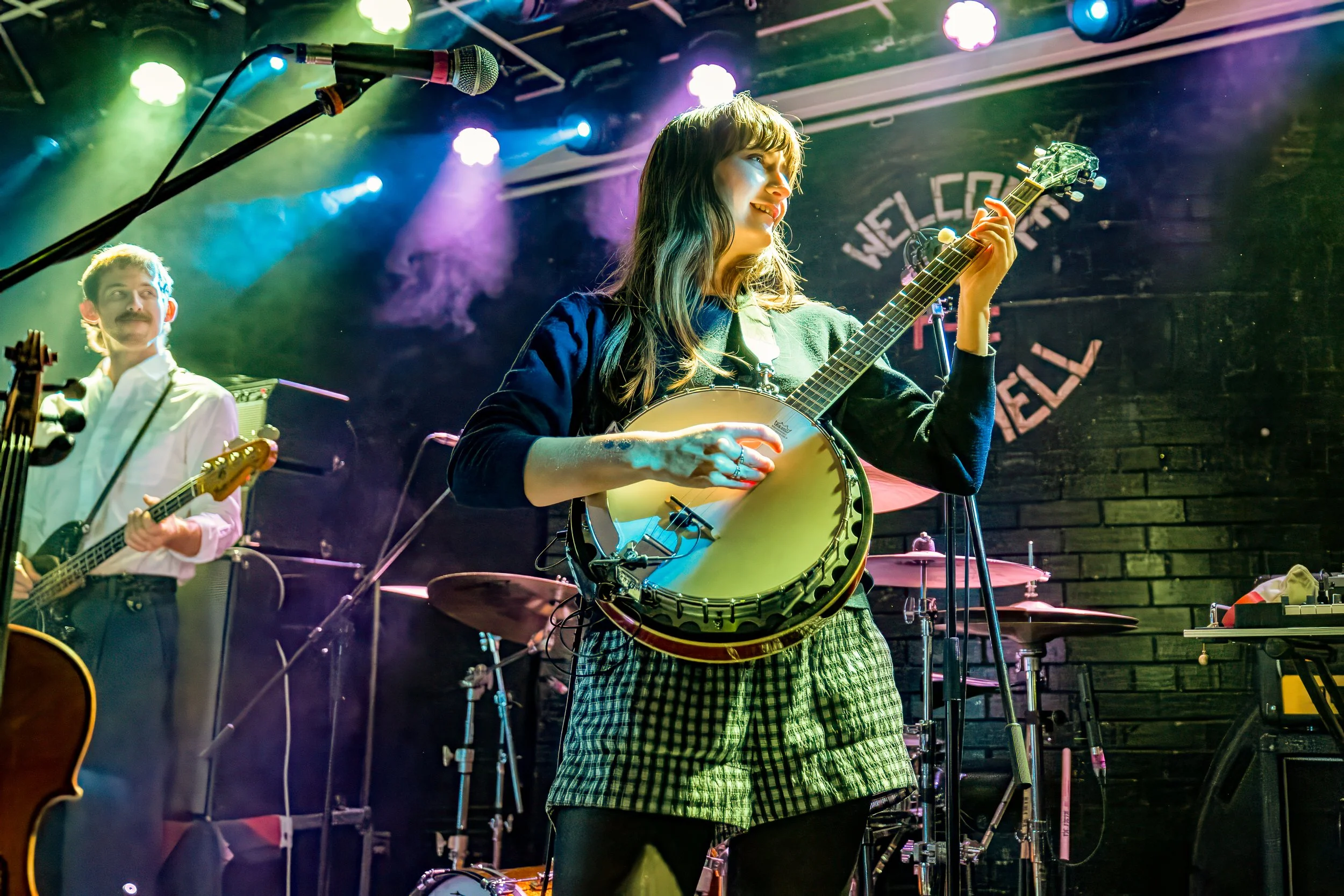THE MURDER CAPITAL // BRUDENELL SOCIAL CLUB, LEEDS
The Murder Capital Conjure Another Art Meets Music Communion on Easter Monday
★★★★★ (5/5)
THE MURDER CAPITAL PERFORMING AT LEEDS BRUDNELL SOCIAL CLUB
PHOTOCREDIT: JOHN HAYHURST
It’s just past 9:20pm at the Brudenell Social Club in Leeds, and the room is humming with anticipation. Local football fans have seen their Leeds United team get promoted to the Premier League next season. However, a sense of quiet reverence always hangs in the air before The Murder Capital take the stage—like everyone here knows they're about to witness something visceral. And they’re right. But before the Dublin quintet drop the hammer, there’s a sense of space and texture built by the evening’s support - Cusk.
Cusk took to the stage with a shy confidence, their blend of dream-pop, alt-country and post-punk washing over the room like sunlight breaking through overcast skies. Their set was a slow burn—haunting and warm, shimmering with reverb-heavy guitar lines and some hazy violin weaving classical fragility into modern pop-rock structures.
Fronting this band is actor and musician Esme Creed-Miles (you may recognise her as Hanna from the Amazon TV series). Her presence was understated but captivating, her tone intimate even in crescendos. By the end of their set, they'd won over the early crowd completely, not with volume but with mood and subtle power. The added banjo curveball on “Dooms Banjo” was Americana at its best and their finale was “Does It Feel Like Love” where Creed-Miles was able to stretch those vocals a little more. It was music to sink into, and it provided the perfect contrast to what was coming.
When The Murder Capital stepped out under the Brudenell’s modest lights, something shifted. They began with “The Fall,” a song that feels like it teeters on the edge of collapse even as it gathers force. Frontman James McGovern's voice cracked with emotion right from the opening lines—equal parts sermon and scream. The band was locked in, sculpting tension out of silence, patience, and sudden bursts of noise. Their performances are where art and music collide in glorious technicolour and it is compelling to watch. I’ve seen this band around 15 - 20 times now and it leaves a mark on me every time.
After we are engulfed in “More Is Less” from their incredible debut album, there is a settling down period where McGovern speaks more openly than I’ve seen him in a while. They love the Brudenell so much, having played here many times in the last 6 years, so choosing a place for a two night residency was easy. He spots a young lad called Taylor in the crowd with his first tattoo of the cover of “Blindness” their 3rd album, he drags him up on stage to show everyone.
“Death Of A Giant” followed, a sweeping, almost cinematic track that turned the room into a trembling cathedral of sound. There's a tenderness in their newer material—a deepening maturity that doesn’t dull their edges, but sharpens them with intent. These were not just songs—they were excavations.
Much of the set drew from their new album Blindness, a record that feels like the band stretching further into shadow and texture. Tracks like “That Feeling” and “Crying” were sprawling and meditative, shimmering with atmosphere but always shot through with raw nerve. “Moonshot” was a surprise and a standout—its brutal crescendos crashing like waves in slow motion, leaving a stunned silence in their wake.
The crowd was a living organism: hushed and reverent in one moment, surging and shouting in the next. There’s something about a Murder Capital crowd that feels collective, communal, almost sacred. People didn’t come here to drink and chat—they came to feel.
Then came the old gods—“Feeling Fades” sparked something primal. It was chaos in the best sense. McGovern stalked the stage, eyes wild, fists clenched - but no stage diving tonight like he has done so many times before. The floorboards shuddered with the force of movement. “Don’t Cling To Life” had a venom that still felt fresh, its chorus barked back by every voice in the room like a war cry.
The main set closed with “Love of Country,” a slow-building elegy that erupted into a storm of guitar wails and cathartic howls. As the band exited at the back, the crowd didn't budge. We knew they weren’t done.
The encore began with “Trailing A Wing,” a bruised, beautiful thing that felt like it could fall apart at any moment. “Ethel” was greeted like an old friend, its emotional gut-punch somehow hitting harder in a live setting. And then, finally—“Words Lost Meaning.” The band poured everything into it, a climactic unravelling of every thread they’d pulled through the night. It wasn’t just a song; it was a release, a reckoning.
The air leaving the Brudenell felt different—heavier, charged. The Murder Capital don’t just play gigs; they conjure them. And tonight was no different. It was dark and beautiful and full of grief and rage and tenderness. It was a reminder of why live music matters—why we gather in dimly lit rooms to be undone and rebuilt, song by song.
For those who were there, it wasn’t just a concert. It was something closer to communion.




























